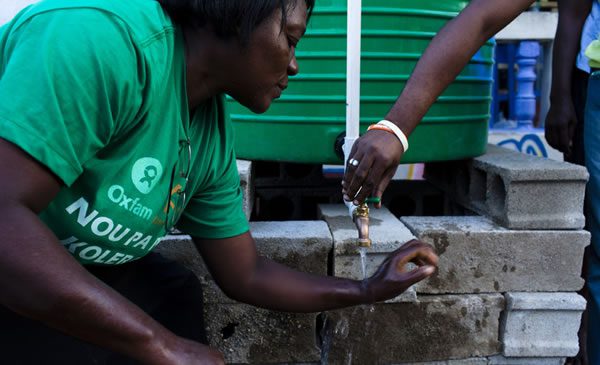
Written by Sophie Martin Simpson, Oxfam’s Monitoring and Evaluation Officer in Haiti
Since the first cases of cholera appeared in Haiti in October 2010, Oxfam has taken action to prevent it’s spread. We have reached more than 700,000 Haitians with sanitation and hygiene promotion programs since. Sophie Martin Simpson, Oxfam’s Monitoring and Evaluation Officer in Haiti, explains what Oxfam and local communities have achieved.
It is my job to support our teams to make sure we are monitoring the progress of our activities and assessing what impact and positive changes our work is making in people’s lives in Haiti. Crucially, this involves gaining feedback on the quality and usefulness of the services we are delivering from the very people we are delivering them to – namely Haitians who have been affected by the earthquake, and more recently, communities hit the hardest by the spreading cholera outbreak.
By listening to what these people have to say, we are able to learn, maintain quality and improve Oxfam’s work in Haiti to ensure maximum positive change in people’s lives.
Monitoring Oxfam’s cholera response
Such information is vital to ensure our cholera response program continues to deliver the key essential services and activities needed to make sure people have the knowledge and resources to protect themselves from cholera. Gathering this type of information, monitoring the success of our activities, and gaining an understanding about what changes they are making to people’s lives will help to achieve the ultimate goal of Oxfam’s cholera response program: to prevent the spread and reduce the number of cases of cholera being reported in the communities hardest hit by the outbreaks.
I have recently returned from two days with our cholera response team in the region of Petite Rivière in Artibonite. I was there to support our team to collect information from the local population about existing water sources, access to basic hygiene facilities such as showers and latrines and knowledge about cholera and cholera prevention. The first cases of cholera were reported in Artibonite in October and the region continues to be one of the worst hit by the outbreak. As such, it is a focus for Oxfam’s cholera response.
Training community volunteers
I visited rural communities and talked with community members, some of whom proudly showed me their newly constructed family latrines. Before Oxfam began its cholera response program, the majority of communities lacked any latrine or toilet facilities. In a number of locations, Oxfam has additionally set up ORS (Oral Rehydration Solution) corners. ORS is the most effective way to keep people with cholera hydrated until the cholera causing bacteria have passed through the body. These corners are staffed by volunteers from the community who have been trained to treat water to ensure it is safe to drink, in hand-washing practices and ORS preparation.
If community members suspect they have cholera, they can get instant assistance from the ORS corner volunteer who supplies them with enough ORS solution and clean water to ensure they stay hydrated on their journey to hospital. Oxfam staff carry out regular spot checks of these corners to ensure the quality of the treated water is adequate and that ORS is being prepared correctly.
I was very happy to hear the corner volunteers report a decrease in the number of people presenting cholera symptoms in the past few weeks. It was also good to hear community members speaking repeatedly about the importance and benefit of having such ORS corners within easy reach of their homes as a means to help treat and prevent the spread of cholera.
Confidence replaces fear
Before the cholera outbreak, many community members were unaware of the symptoms of cholera, how it was transmitted or how to treat it. Since the outbreak, Oxfam has been working hard to educate people about these issues.
I attended two community meetings during which community members were encouraged to share what they had learned about cholera symptoms, ORS preparation and how to handle the bodies of people who have died from cholera. Although a rather morbid subject, it is essential that people know what to do with cadavers to ensure the cholera microbes from the bodies do not penetrate the local soil or water supplies. It was great to watch each and every person at the meeting stand up and with confidence literally shout what they knew through a megaphone!
It was also reassuring to find the mystery and fear surrounding cholera, which was prevalent during the early weeks of the outbreak, dissipating. Oxfam’s health and hygiene messages are clearly getting through to increasing numbers of people who now have the knowledge, skills and resources to effectively treat and manage cholera within their communities.